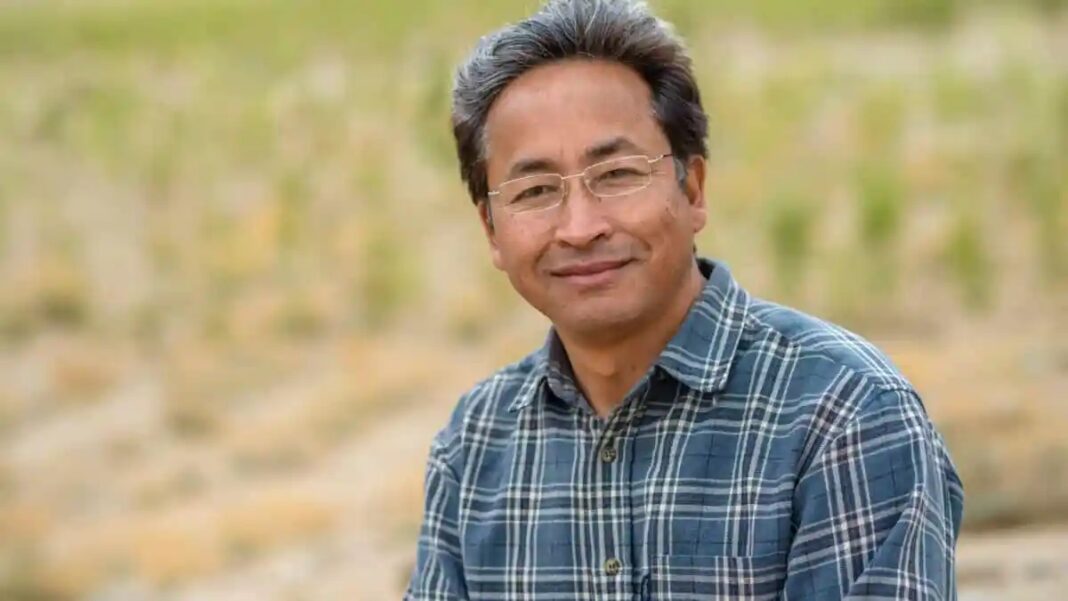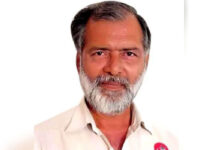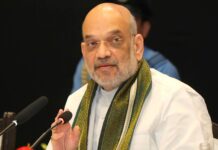In a significant demonstration for autonomy and environmental rights, Sonam Wangchuk, a prominent Ladakh-based activist, along with over 100 protestors, was detained near Delhi on the evening of September 30. Their peaceful march aimed to highlight demands for greater administrative autonomy for Ladakh, culminating at Bapu’s Samadhi, the memorial of Mahatma Gandhi. Wangchuk took to X (formerly Twitter) to express his dismay, stating, “We were on a most peaceful march to Bapu’s Samadhi in the largest democracy in the world, the mother of democracy… Hai Ram!”
The situation escalated when the Delhi police prevented Delhi Chief Minister Atishi from meeting the protestors on Tuesday. Prominent political figures, including Lok Sabha Leader of Opposition Rahul Gandhi, condemned the police action. Gandhi voiced his concerns on social media, stating, “The detention of Sonam Wangchuk ji and hundreds of Ladakhis peacefully marching for environmental and constitutional rights is unacceptable.”
Concerns Over Restrictions and Autonomy
Wangchuk, in a video shared on his X account, revealed that the Delhi Police had imposed restrictions akin to Section 144, prohibiting gatherings of more than five people between September 30 and October 6. He remarked, “It seems as if they do not want the march to happen, although it was completely peaceful.”
The march, which started in September, was initiated to urge the Central government to discuss demands for greater autonomy in Ladakh’s governance. Wangchuk, who is not only an activist but also an engineer and sustainable product innovator, gained international recognition when he received the Ramon Magsaysay Award in 2018 for his impactful work in improving educational opportunities for Ladakhi youth.
Historical Context of the Movement
The push for autonomy is not new; Wangchuk has been advocating for the inclusion of Ladakh under the Sixth Schedule of the Indian Constitution, which provides for autonomous administrative regions through Autonomous District Councils (ADCs). In 2019, Wangchuk wrote to then Union Tribal Affairs Minister Arjun Munda, seeking Scheduled Area status for Ladakh. While Munda acknowledged the request, subsequent discussions with Ladakhi leaders have been absent.
In 2019, student-led protests emerged, supported by former MP Thupstan Chhewang, who helped form the Leh Apex Body (ABL), and organizations in Kargil established the Kargil Democratic Alliance (KDA) to push for these demands. Wangchuk has reiterated that protections under the Sixth Schedule were part of an election promise made by the BJP in 2019, emphasizing that the Government of India must uphold its commitments.
The Significance of the Sixth Schedule
The Sixth Schedule under Article 244 of the Indian Constitution allows for the establishment of Autonomous District Councils, which can enact laws concerning various local matters, including land, forest, water, agriculture, and local policing. Currently, the Northeast region of India hosts 10 ADCs across four states. Wangchuk has pointed out that the people of Ladakh are seeking decentralization of power due to concerns that “lower levels of bureaucracy” might be swayed by industrial interests and business houses that favor extensive mining activities across Ladakh’s valleys.
As the situation develops, the march led by Wangchuk and his supporters continues to draw attention to the pressing need for greater autonomy and environmental protections in Ladakh, reflecting a broader struggle for rights and recognition in the region.








Hi there! Do you know if they make any plugins to help
with SEO? I’m trying to get my site to rank for some targeted keywords but I’m not seeing very good results.
If you know of any please share. Thanks! You can read similar text here:
Blankets
can i order generic clomiphene for sale cost of cheap clomiphene online can you get cheap clomiphene prices can i order generic clomid prices where can i get cheap clomiphene no prescription can i buy cheap clomiphene pill clomid brand name
The reconditeness in this ruined is exceptional.
azithromycin us – tetracycline 250mg for sale buy cheap metronidazole
buy generic domperidone online – order generic domperidone 10mg flexeril ca
inderal 20mg price – buy clopidogrel without a prescription methotrexate canada
cheap amoxil generic – buy ipratropium online buy ipratropium 100mcg online
oral augmentin – atbioinfo ampicillin over the counter
brand nexium 40mg – nexiumtous buy nexium without a prescription
buy medex tablets – coumamide.com order hyzaar online cheap
buy mobic – tenderness mobic cost
deltasone 20mg tablet – https://apreplson.com/ cost prednisone 5mg
where to buy ed pills – fastedtotake.com buy ed medication online
amoxil for sale online – https://combamoxi.com/ oral amoxicillin
order fluconazole 100mg sale – https://gpdifluca.com/ diflucan 100mg cost
order cenforce 100mg – https://cenforcers.com/ cenforce 50mg uk
buy generic ranitidine 300mg – https://aranitidine.com/ buy ranitidine 300mg generic
I couldn’t turn down commenting. Well written! clomid espaГ±ol
This is a theme which is near to my fundamentals… Diverse thanks! Quite where can I lay one’s hands on the connection details due to the fact that questions? buy accutane australia
This is the amicable of glad I have reading. https://ursxdol.com/clomid-for-sale-50-mg/
The reconditeness in this serving is exceptional. online
The vividness in this ruined is exceptional. https://aranitidine.com/fr/ciagra-professional-20-mg/
This is a topic which is forthcoming to my callousness… Numberless thanks! Unerringly where can I upon the phone details in the course of questions? https://ondactone.com/simvastatin/
More posts like this would make the online space more useful.
order aldactone for sale
forxiga 10mg over the counter – where can i buy forxiga dapagliflozin uk
xenical without prescription – buy orlistat online cheap buy orlistat pill
With thanks. Loads of expertise! http://www.dbgjjs.com/home.php?mod=space&uid=533053
You can keep yourself and your ancestors by way of being alert when buying prescription online. Some druggist’s websites manipulate legally and put forward convenience, secretiveness, bring in savings and safeguards over the extent of purchasing medicines. buy in TerbinaPharmacy https://terbinafines.com/product/norvasc.html norvasc
You can conserve yourself and your stock nearby being heedful when buying prescription online. Some druggist’s websites operate legally and provide convenience, privacy, sell for savings and safeguards over the extent of purchasing medicines. buy in TerbinaPharmacy https://terbinafines.com/product/reglan.html reglan
This is the kind of scribble literary works I truly appreciate. TerbinaPharmacy
You can conserve yourself and your ancestors nearby being heedful when buying pharmaceutical online. Some pharmacopoeia websites manipulate legally and offer convenience, privacy, rate savings and safeguards as a replacement for purchasing medicines. http://playbigbassrm.com/es/
This is the stripe of topic I get high on reading.
专业构建与管理谷歌站群网络,助力品牌实现全域流量的强势增长。谷歌站群
Với giao diện mượt mà và ưu đãi hấp dẫn, MM88 là lựa chọn lý tưởng cho các tín đồ giải trí trực tuyến.
Đến với J88, bạn sẽ được trải nghiệm dịch vụ cá cược chuyên nghiệp cùng hàng ngàn sự kiện khuyến mãi độc quyền.
Tham gia cộng đồng game thủ tại Go88 để trải nghiệm các trò chơi bài, poker phổ biến nhất hiện nay.
best gambling app
casino table toppers spa
real casino real money canada
mcluck Delaware mcluckcasinogm mcluck Connecticut
wowvegas.com offers an titillating no-real-money casino knowledge filled with top-tier slots and time-honoured giveaways. Players love the eleemosynary sign-up bonuses and the wit to be the victor in redeemable Sweepstakes Coins because of diverting gameplay.
Sweet Bonanza tempts you with juicy fruits, heart candies, and bomb multipliers ready to explode your balance. One sweet bonanza 1000 max win lucky spin can change everything. Dive into the sweetness!
Chumba Casino gives you more ways to win every single day. chumba casino promo welcome bonus + daily rewards = big prize potential. Join now!
The casino that turned $0.20 into $2,000,000+ live on stake original games stream — multiple times. Anything can happen here.